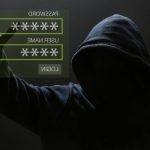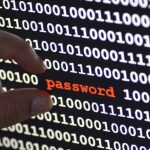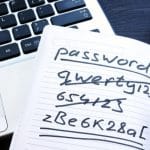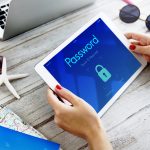Password frustrations lead two-thirds of shoppers to abandon their carts

Poor account and password experiences at checkout mean two-thirds of shoppers abandon a shopping cart if they need to create an account according to new research.
Passwordless security firm, Beyond Identity surveyed more than 1,000 people in the UK and found that 62 percent of respondents have abandoned a shopping cart if required to create an account.
How technology is looking to replace passwords [Q&A]

We've been told for a long time that passwords are on the way out. Indeed no less a figure than Bill Gates predicted the death of the password at 2004's RSA conference, yet we still rely on them for managing much of our day-to-day access.
But things are starting to change. Patrick McBride, CMO at Beyond Identity, believes that the technology to eliminate passwords and replace them with something more secure is starting to take off. We talked to him to discover more.
How location technology and zero factor authentication could change the security landscape [Q&A]

The death of the password has been predicted for a long time, but although it's been augmented by things like multi-factor authentication and biometrics, it still clings to life.
However, businesses are looking for ways to eliminate fraud without impacting the customer experience. One way to do this is to use location technology to provide ‘zero factor’ authentication, allowing businesses to protect themselves and their customers without disrupting the customer experience.
Now everyone can make their Microsoft account passwordless

Having already given commercial users the option of adopting passwordless sign-in, Microsoft is doing the same for consumers. Starting today, users have the option of removing the password from their Microsoft account and choosing different methods of authentication.
The move means that is now possible to access the likes of OneDrive, Outlook and other Microsoft services without the need to remember or enter a password. But this does not mean having to compromise on security.
2FA use grows as consumers look for better protection

A new report from Cisco's Duo Security arm shows that 79 percent of respondents report having used 2FA in 2021, compared to 53 percent in 2019 and just 28 percent in 2017.
Only 32 percent report using 2FA on all applications where available though, so there's still room for improvement.
Username and password breaches increase by 450 percent

A new report from identity specialist ForgeRock reveals a massive 450 percent surge in breaches containing usernames and passwords globally.
The report also finds that unauthorized access was the leading cause of breaches for the third consecutive year, increasing year-on-year for the past two years, and accounting for 43 percent of all breaches in 2020.
Login experiences are not delivering for consumers

New research by YouGov for identity platform Auth0 finds that many businesses are falling short of consumer expectations on login technologies -- and risk frustrating their users, losing sales, and opening themselves up to credential stuffing attacks as a result.
The study shows that consumers around the world want greater choice in login technologies, and that they're willing to actively seek them out. Nearly half (49 percent) of consumers surveyed say they are more likely to sign up to an app or online service if a company offers multi-factor authentication (MFA).
What's your password personality?

Nearly half (49 percent) of US employees create their own tricks and shortcuts for managing logins, leaving business systems open to attack.
A new report from password manager company Dashlane, created in conjunction with Datalands and based on a survey of 1,000 people, identifies four different employee personas, and the potential barriers these employees may cause to security culture.
1Password for Linux is finally here for Arch, Ubuntu, Manjaro, Mint, Debian, Fedora, and more

If you aren't using an online cloud-based password manager to both create and store your various passwords, you are doing yourself a great disservice. True, storing your passwords in the cloud seems counter-intuitive, but in reality, it is far more secure than re-using passwords or writing them down. Of course, you should make sure you are also using Two-Factor Authentication (2FA) whenever possible too.
On the desktop, there are many password managers for Windows and Mac, but on Linux, things are far more limited. For instance, 1Password is arguably the best password manager in the world, yet despite a decade of requests for it to come to Linux, it never did. Sure, Linux users could use the 1Password X browser plugin, but there was no native Linux version. Well, folks, the time has finally arrived. Following a lengthy Beta period, today, developer Agilebits finally releases a stable 1Password for all modern Linux distributions!
Beyond Identity looks to a passwordless future

The death of the password has been predicted for a long time, yet it remains the most common way of logging into systems.
Identity management company Beyond Identity is looking to solve what is one of the biggest challenges in IT security and aims to re-establish trust in authentication chains by finally eliminating passwords as the weakest link.
Google introduces new features to protect passwords

Google is taking steps to make people's accounts more secure by announcing two initiatives to mark World Password Day.
Firstly it's automatically enrolling all Google account users in two-factor authentication. This will begin with accounts that are appropriately configured for this transition. You can see whether your account is ready in Security Checkup.
Hints and tips for World Password Day

Today is World Password Day, in case you hadn't already noticed, a day to promote better password management and safer password choices.
With billions of sets of stolen credentials circulating on the dark web, naturally there is plenty of advice and opinions on offer from the industry, so here's a look at some of what experts are saying about passwords, the vulnerabilities they represent and how they might be replaced.
Surprise, surprise, consumers don't like passwords

There will doubtless be a lot of comment surrounding today's World Password Day (watch this space) but to kick off we'll start with a new survey which shows that people aren’t keen on passwords at all.
The study from identity verification and authentication company Onfido reveals a variety of unpleasant activities that people would rather engage in than create a unique password.
More than half of US employees write passwords on sticky notes

According to a new study, 57 percent of American employees are currently writing down work-related passwords on sticky notes, leading to significant cybersecurity risk.
In addition, the report from Keeper Security shows 66 percent have lost these sticky notes in the past, making it difficult to know who ultimately has access to sensitive company information.
Passwords are bad for online business

According to a report from Transmit Security, more than half of consumers have stopped using a website because of the login process and more than 87 percent have been locked out of an online account because of an error-ridden password process.
The survey of 600 US consumers finds organizations are losing potential customers and a substantial amount of revenue because of their dependency on traditional password systems and outdated customer authentication models.
Recent Headlines
Most Commented Stories
BetaNews, your source for breaking tech news, reviews, and in-depth reporting since 1998.
© 1998-2025 BetaNews, Inc. All Rights Reserved. About Us - Privacy Policy - Cookie Policy - Sitemap.